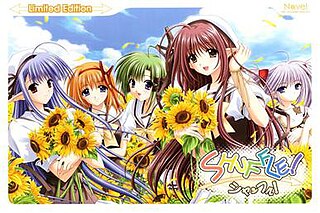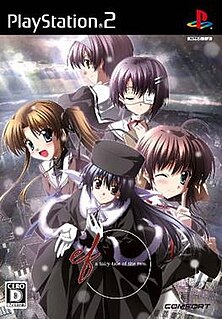
Kanon ("Canon") is a Japanese adult visual novel developed by Key and released on June 4, 1999 for Windows PCs. Key later released versions of Kanon without the erotic content, and the game was ported to the Dreamcast, PlayStation 2 and PlayStation Portable. The story follows the life of Yuichi Aizawa, a high school student who returns to a city he last visited seven years prior, and he has little recollection of the events from back then. He meets several girls and slowly regains his lost memories. The gameplay in Kanon follows a branching plot line which offers pre-determined scenarios with courses of interaction, and focuses on the appeal of the five female main characters by the player character. The game once ranked as the second best-selling PC game sold in Japan, and charted in the national top 50 several more times afterwards. Kanon has sold over 300,000 units across several platforms.

Key is a Japanese visual novel studio known for making dramatic and plot-oriented titles. It was formed on July 21, 1998, as a brand under the publisher Visual Arts, and is located in Kita, Osaka.

Clannad is a Japanese visual novel developed by Key and released on April 28, 2004 for Windows. While both of Key's first two previous works, Kanon and Air, had been released first as adult games and then censored for the younger market, Clannad was released with a rating for all ages. It was later ported to the PlayStation 2, PlayStation Portable, Xbox 360, PlayStation 3, PlayStation Vita, PlayStation 4 and Nintendo Switch consoles. An English version for Windows was released on Steam by Sekai Project in 2015.

Air is a Japanese adult visual novel developed by Key and released on September 8, 2000, for Windows PCs. Key later released versions of Air without the erotic content, and the game was ported to the Dreamcast, PlayStation 2, PlayStation Portable and PlayStation Vita. The story follows the life of Yukito Kunisaki, a traveling showman searching for the "girl in the sky". He arrives in a quiet, seaside town where he meets three girls, one of whom is the key to the end of his journey.

Planetarian: The Reverie of a Little Planet is a Japanese post-apocalyptic visual novel developed by Key, a brand of VisualArt's whose previous works include Kanon and Air. It was released over the Internet on November 29, 2004 for Windows, and is rated for all ages. The game was later ported to the PlayStation 2 (PS2), PlayStation Portable and Nintendo Switch, as well as mobile devices. The story centers on a man who comes across a malfunctioning robot in a dead city. The man, known simply as "the junker", stays with this robot for a time and attempts to fix the projector of the planetarium where the story takes place.

Shuffle! is a Japanese visual novel developed by Navel. It was originally released as an adult game for Windows on January 30, 2004. It was subsequently followed by an all-ages release for the PlayStation 2 (PS2) and an expanded adult release for Windows. The Windows version was localized in English by MangaGamer in 2009, and the PS2 version was localized in English by YumeHaven in 2016 on Steam. The gameplay in Shuffle! follows a branching plot line which offers pre-determined scenarios and courses of interaction and focuses on the appeal of the female main characters. Shuffle! has been re-made into an expanded version called Shuffle! Essence+. It has expanded routes for the original five main heroines as well as new routes for six other characters. Shuffle! also has three spin-off sequels: Tick! Tack!, Really? Really! and Shuffle! Love Rainbow.

Da Capo is a Japanese adult visual novel developed by Circus's division Circus Northern which was released as a limited edition on June 28, 2002 playable on Windows as a CD-ROM; a DVD-ROM version followed on July 26, 2002. An English release was scheduled for December 25, 2008, and the game was available for a brief time on that date, but the title was pulled until January 20, 2009. Da Capo began as a series of prelude short scenarios in the Suika fandisc Archimedes no Wasuremono, and since the initial release, there have been numerous different versions released for Windows and PlayStation 2 over the years with updated scenarios and characters. The gameplay in Da Capo follows a plot line which offers pre-determined scenarios with courses of interaction, and focuses on the appeal of the seven female main characters.

Snow is a Japanese adult visual novel developed by Studio Mebius for Windows PCs on January 31, 2003. It was later ported without the erotic content to the Dreamcast, PlayStation 2, and PlayStation Portable consoles. The story of Snow revolves around the life of Kanata Izumo, who is revisiting a village to help his relative manage a hot spring inn. The gameplay in Snow follows a branching plot line which offers pre-determined scenarios with courses of interaction, and focuses on the appeal of the female main characters by the player character.

Tomoyo After: It's a Wonderful Life is a Japanese adult visual novel developed by Key released on November 25, 2005 for Windows PCs. The game is a spin-off of Key's earlier all ages game Clannad. Key later released versions of Tomoyo After without the erotic content, and the game was ported to the PlayStation 2, PlayStation Portable, Xbox 360, PlayStation 3 and Nintendo Switch under the title Tomoyo After: It's a Wonderful Life CS Edition; CS stands for "consumer software". The story follows the lives of Tomoya Okazaki, a young man who recently graduated from high school, and his close friend Tomoyo Sakagami as they start to see more of each other in a romantic relationship.
Air is a visual novel developed by Key and published by VisualArt's in 2000. The story follows Yukito Kunisaki, a traveler who arrives in a quiet seaside town during summer who is on a search for the "girl in the sky" that his now-deceased mother told him about and was searching for too. In town, Yukito meets three strange girls and Yukito begins to suspect that one of them may in fact be the girl he has been searching for. It was adapted by Toei Animation into an animated film in 2005 directed by Osamu Dezaki with music direction by Yoshikazu Suo. Kyoto Animation also adapted it into a 13-episode anime television series broadcast in 2005, along with an additional two episodes also broadcast in 2005, directed by Tatsuya Ishihara with music direction by Shinji Orito. The discography of Air and its anime adaptations consists of one EP, one single, two soundtracks, and three remix albums.
Kanon is a visual novel developed by Key and published by VisualArt's in 1999. The story follows Yuichi Aizawa, who has returned to the town where seven years ago he would spend his school vacations, but has forgotten many of the details regarding his previous visits. Over the course of the series, Yuichi slowly regains these memories as he meets new friends and is reacquainted with others from his past. It was adapted by Toei Animation into a 13-episode anime television series broadcast in 2002 along with an accompanying original video animation episode released in 2003, both directed by Takamichi Itō with music direction by Hiroyuki Kōzu. Kyoto Animation also adapted it into a 24-episode anime television series broadcast between 2006 and 2007 directed by Tatsuya Ishihara with music direction by Shinji Orito. The discography of Kanon and its anime adaptations consists of one compilation album, three singles, three soundtracks, and three remix albums.

Little Busters! is a Japanese visual novel developed by Key. It was released on July 27, 2007 for Windows PCs and is rated for all ages. Little Busters! is Key's sixth game, along with other titles such as Kanon, Air, and Clannad. An adult version of the game titled Little Busters! Ecstasy was released on July 25, 2008 for Windows, unlike Kanon and Air, which were first released with adult content and then had later versions with such content removed. Ecstasy was later ported to the PlayStation 2, PlayStation Portable, PlayStation Vita, PlayStation 3, and Nintendo Switch with the adult content removed under the title Little Busters! Converted Edition. An English version for Windows was released on Steam in 2017. The story follows a group of childhood friends now attending high school called the Little Busters, as they decide to form a baseball team. Riki, who is diagnosed with narcolepsy, is tasked to recruit more girls in preparation for a baseball game, and he bonds with each of them on account of their internal conflicts. Meanwhile, Rin gets mysterious letters from her cat Lennon to complete various tasks in order to learn the "secret to this world".

Jun Maeda is a Japanese writer and co-founder of the visual novel brand Key under Visual Arts. He is considered a pioneer of nakige visual novels, and has mainly contributed as a scenario writer, lyricist, and musical composer for the games the company produces. His style was originally inspired by James Herbert Brennan, and is influenced by Haruki Murakami's novel Hard-Boiled Wonderland and the End of the World.
Magome Togoshi is a Japanese video game composer for visual novel studios. He began work as a music arranger in 1999, where he started working for the visual novel studio Key under VisualArt's to produce music for Kanon. Between then and 2006, Togoshi composed music for four more titles by Key, along with other games produced by game brands also under VisualArt's. In October 2006, Togoshi resigned from Key and VisualArt's. He continues working with other visual novel developers.

Ef: A Fairy Tale of the Two is a Japanese two-part adult visual novel series by Minori for Windows PCs. The first game in the series, Ef: The First Tale, was released on December 22, 2006, and the second game, Ef: The Latter Tale, was released on May 30, 2008. The opening video for the game was animated by Makoto Shinkai, and a majority of the music was produced by Tenmon, who has worked in the past with Shinkai and Minori. Female character design was by Naru Nanao of Da Capo fame, while male character design was by 2C Galore.

Sora o Tobu, Mittsu no Hōhō. is a Japanese adult visual novel developed by La'cryma. It was released on July 25, 2008 for Windows as a limited edition DVD. The gameplay in Soramitsu follows a linear plot line, which offers pre-determined scenarios and courses of interaction, and focuses on the appeal of the female main characters.

5 is a Japanese adult visual novel developed by Ram that was released on July 25, 2008, for Windows as a DVD. 5 is the third game developed by Ram, and the first to be released after an eight-year hiatus since the first release of their last game, Koigokoro. The game is described by the development team as a "dramatic adventure", and a "noisy northern province love comedy". The game bears the tagline, "Five little love tales which are likely to be buried in snow." The gameplay in 5 follows a linear plot line, which offers pre-determined scenarios and courses of interaction, and focuses on the appeal of the five female main characters.

Key Net Radio was a Japanese Internet radio program produced by VisualArt's and the visual novel studio Key in regard to Key and the games the brand produces. Thirty broadcasts were released online from December 13, 2007 to August 30, 2010. The show was hosted by Shinji Orito and Itaru Hinoue of Key, and another woman named Chiro who works for Pekoe, another visual novel studio under VisualArt's. Guests have been known to appear on the show including Jun Maeda and Na-Ga of Key. Each broadcast was recorded and were available via download on Key's official website after being edited by Orito, though Hinoue filled in for Orito on some occasions. The episodes were available for download on the radio show's official blog for the first nine broadcasts, and the first 27 episodes are no longer available for download. The more recent broadcasts could be listened to on VisualArt's' YouTube channel named Visual Channel. Listeners could submit thoughts about the show and any requests they may have for the show, along with submitting questions to the host trio. Key Net Radio's mascot is named Kirara and is drawn by Itaru Hinoue.

Kud Wafter is a Japanese adult visual novel developed by Key, released on June 25, 2010 for Windows. Kud Wafter is Key's eighth game, along with other titles such as Kanon, Air, and Clannad. Key released a version of Kud Wafter without the erotic content, and the game was ported to the PlayStation Portable and PlayStation Vita. The story follows the lives of high school students Riki Naoe and his close friend Kudryavka Noumi as they start to see more of each other in a romantic relationship. The gameplay in Kud Wafter follows a branching plot line which offers pre-determined scenarios with courses of interaction, and focuses on the appeal of the title character Kudryavka, also known as "Kud" for short.

Da Capo III is a Japanese visual novel developed by Circus that was released in limited and regular editions on April 27, 2012 as a DVD for Windows and is rated for ages 15 and up. It is the third main installment of the Da Capo visual novel franchise, after Da Capo and Da Capo II. The story takes place 20 years after the events from Da Capo II. The gameplay in Da Capo III follows a branching plot line which offers pre-determined scenarios with courses of interaction, and focuses on the five female main characters. A 13-episode anime adaptation aired between January and March 2013.
















